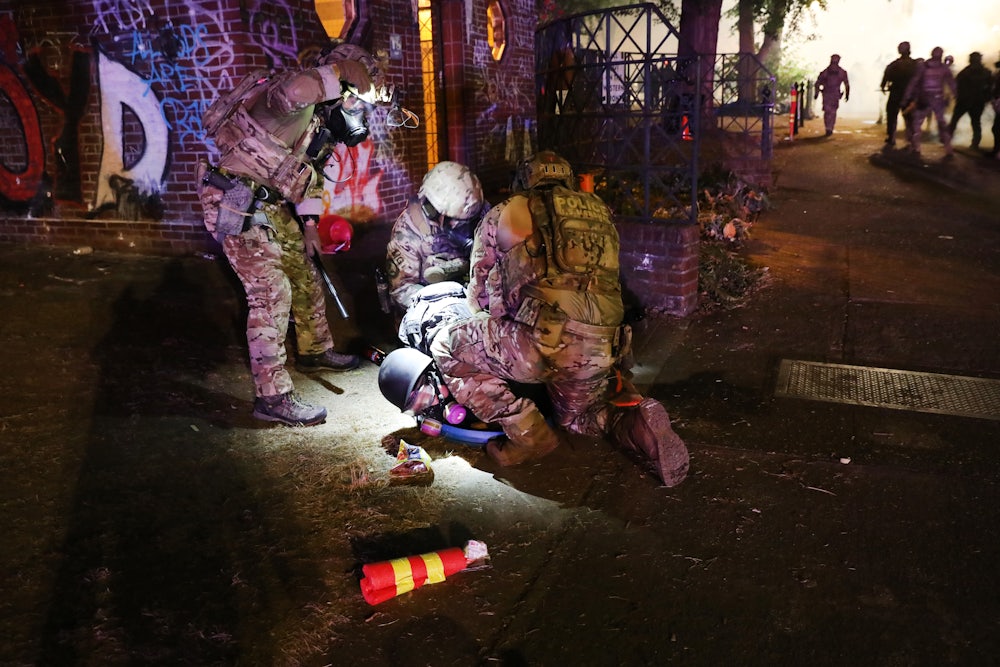The chaos on the streets of Portland, Oregon, where President Donald Trump’s deployment of federal agents has resulted in violent unrest, was made for TV—or, perhaps more accurately, for Twitter.
“Trump’s campaign officials say that the president wants to amplify his law-and-order message to show he is a last bastion of safety for a reeling American public, and that U.S. cities ravaged by crime and unrest—which also happen to be heavily Democratic—are the right venue,” reported The Washington Post over the weekend. One administration official was blunter: The president’s actions in cities, whether in response to protests or immigration, were focused on “getting viral online content.”
Trailing Joe Biden by as many as a dozen points in the polls as coronavirus cases surge and the economy frays, the president is stretching out a canvas on which he can paint his “law and order” message: Elect me or watch your city burn. Even for Trump, who has repeatedly amplified minor crises for political ends—the deployment of several thousand troops to the Mexican border before the 2018 midterms being just one high-profile example—it is a shameless and craven move, one that has rightfully been decried as “fascistic.” (Given the fact that Trump is fearmongering about a future Biden presidency by highlighting unrest happening on his own watch, it’s also deeply ironic.) It only underscores the emptiness of Trumpism: He sees a fresh boogeyman around every corner and is wholly impotent at dealing with them. And yet, with less than one hundred days to go until the 2020 election, Trump’s amped-up rhetoric is also a test for the media, which has fallen for this act again and again. There’s no telling if doing so once more won’t have dire consequences.
Trump has largely governed as the political equivalent of an arsonist in firefighter’s clothing. As president, he has repeatedly set conflagrations, turning minor events into all-consuming spectacles: Two years ago, it was a caravan of migrants approaching the southern border, this year’s scare is the toppling of statues by Black Lives Matter protesters. These are old moves. “The Trump candidacy was itself based on creating a sense of crisis,” The Atlantic’s David Graham wrote before the 2018 midterm elections. In 2016, the economy was growing, and crime was declining. Trump, nevertheless, described the United States as if it were a Hieronymous Bosch painting: devastation, desolation, violence everywhere. The solution? Trump himself embodied it: “I alone can fix it,” he said at the 2016 Republican National Convention.
But even as Trump amplifies minor matters into existential crises—the better to argue that he alone stands between the country and total chaos—the reality is that he has consistently shrunk from the many real plights the country has faced during his tenure. Trump has consistently refused to lead when it comes to major issues, whether they be national disasters, mass shootings, social unrest, economic collapse, or a global pandemic. The president’s only real talent is for concentrating attention, particularly media attention; he has persistently used this talent to shirk responsibility and direct attention toward issues he believes are more favorable for him politically, namely immigration and crime.
The federal agents who were deployed to Portland and Seattle were not sent there to protect monuments or to make those cities safer. They were sent there to inflame tensions and turn peaceful protests into violent spectacles. Indeed, officials in Portland were not notified in advance. “We had heard about it first when they were already here,” Portland Mayor Ted Wheeler said. “What we had been seeing on our streets was a de-escalation of the criminal activity, the violence, the vandalism that was being engaged in by a handful of people—we were seeing that tail off significantly.” With the protests that had followed George Floyd’s killing dying down, Trump was desperate for violence in liberal enclaves. By sending agents to Portland, he lit the match anew; he now claims that he is the only person who can stop the fire from spreading.
These scare tactics are, to a large extent, the only civic product that Trumpism and, for that matter, the modern Republican Party produces. He and his cohort have little to offer on the interlocking crises that have defined the last five months; they seem bent on eroding their one good idea: bolstering unemployment insurance during the pandemic’s ravages. The Trump White House made a complete hash of containing the coronavirus’s spread; most of the rest of the developed world has contained it. Protests against police violence, meanwhile, are being turned into a theater of political violence so that the president can attempt to scare suburban voters into backing him.
Trump’s gambits have not always worked. His attempt to turn the 2018 midterms into a referendum on immigration by casting a peaceful caravan of migrants as a plague of death and destruction hurtling toward the border failed to dissuade voters from allowing Democrats to retake the House by historic margins. But whether out of fear of criticism from Trump and other administration officials or because he was serving up reliable helpings of partisan conflict—the oxygen that sustains mainstream media —Trump was nevertheless able to center a great deal of media attention on the caravan.
Two years later, the electoral message is the same: Elect me or we will be overrun by violent thugs. Except now, Trump is flooding the streets of American cities with federal agents, authoring the very anarchic unrest of which he warns. There is a story here, but it’s not one about riots or about a surge in violence in American cities. It’s about the president provoking violence and destruction in a last-ditch effort to ensure his own political survival, and whether the political press is going to fall for it.
